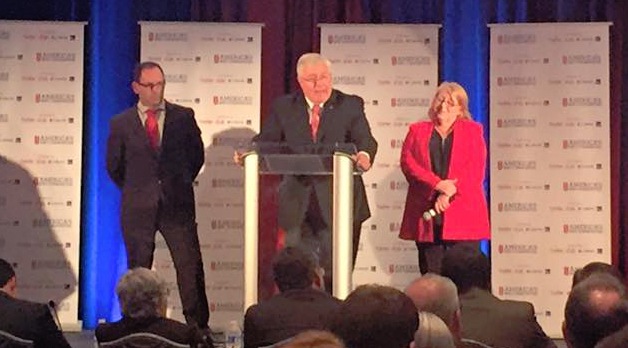ARLINGTON — The Arlington and Darrington team was among the eight communities that made the finals of the America’s Best Communities competition today.
Former Snohomish County Executive Bob Drewel made the presentation in Durham, N.C., April 27, after which Arlington Mayor Barbara Tolbert and Darrington Mayor Dan Rankin joined him in answering judges’ questions.
“This community defines resilience,” Drewel said. “Few communities have faced challenges like ours. Our tragedy does not define us, but it has already served as a catalyst for change.”
The team was one of 15 nationwide to meet in North Carolina April 26-27. The summit was designed to winnow the teams down to eight. Each will receive $100,000 and meet again next year to determine the three finalists.
Out of 350 entrants, 50 were selected as quarterfinalists and awarded $50,000 each in seed money last year. The top three communities at the end will share $6 million in prize money. The winning community will be awarded $3 million, with $2 million for second place and $1 million for third.
The contest’s financial prizes are intended to support the development of economic opportunities in small towns and rural communities within the 27 states served by Frontier.
Arlington and Darrington’s plan was launched in the wake of the 2014 Oso slide, and lays out a strategy for sustainable development that maintains the Stillaguamish Valley’s identity and quality of life.
“The crumbling of the timber industry already dealt a blow to our economy before the slide, but our mayors saw a window of opportunity,” Drewel said. “This competition has been a vehicle to engage our communities, and given them something to celebrate.”
The team outlined six goals in the areas of infrastructure, industries and employment, community and workforce development, resilience and sustainability, placemaking and rural innovation.
Although Frontier responded swiftly to restore phone and Internet service after the slide, its absence highlighted the need for equal access to the Internet, so the team’s plan calls for two public Wi-Fi hot spots.
One judge wondered whether people would be wary of future landslides, but Drewel pointed out that the plan calls for increased investment in the Glacier Peak Institute’s slide-monitoring efforts.
Rankin added that the community has called upon the state legislature to implement new land-use requirements, and Drewel cited the state’s Highway 530 committee as evidence of its responsiveness to such issues.
“We can’t downplay that,” Rankin said. “We have to embrace the truth.”
When another judge asked what economic opportunities the team would introduce, Tolbert noted that Arlington has already become home to approximately 170 advanced manufacturers, and touted the synergy of fostering aerospace businesses in such close proximity to Boeing.
Rankin sees a future in tackling timber from a different angle, by restoring healthy forests.
Gov. Jay Inslee came away from a meeting with the Darrington-Arlington team’s presenters expressing enthusiasm for their work.
Inslee sat on a practice panel of judges for a presentation by Drewel, Tolbert and Rankin at the Arlington Airport April 7, where they delivered a preliminary version of their talking points for Durham.







